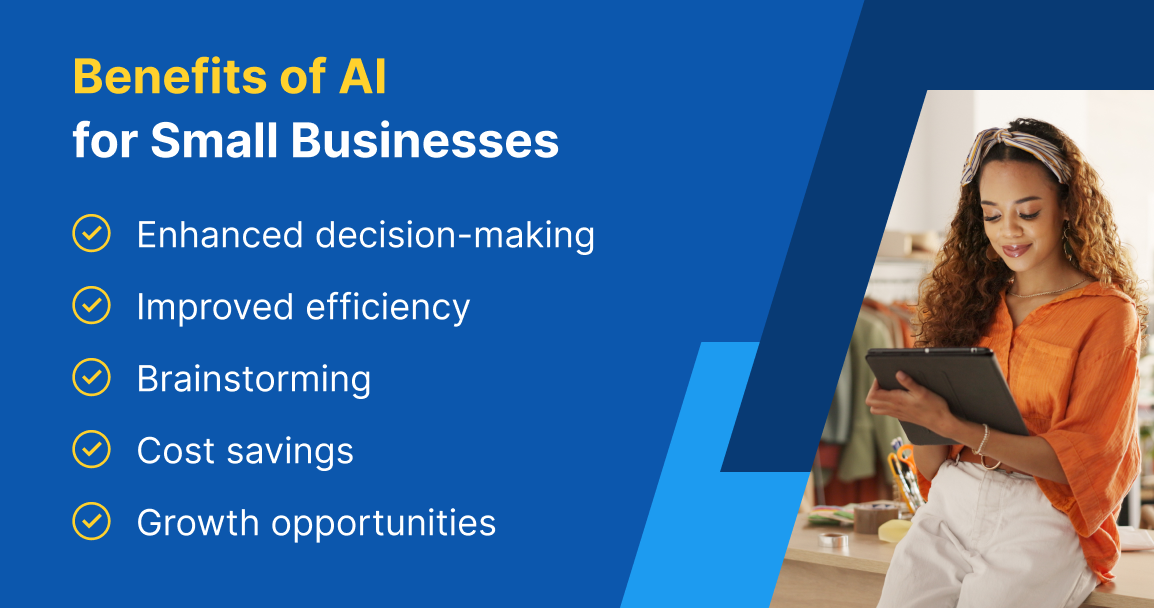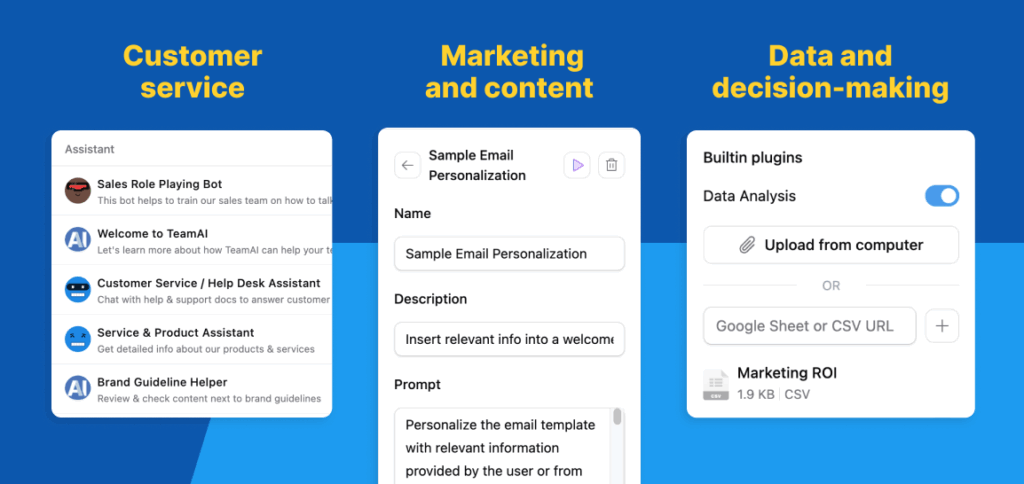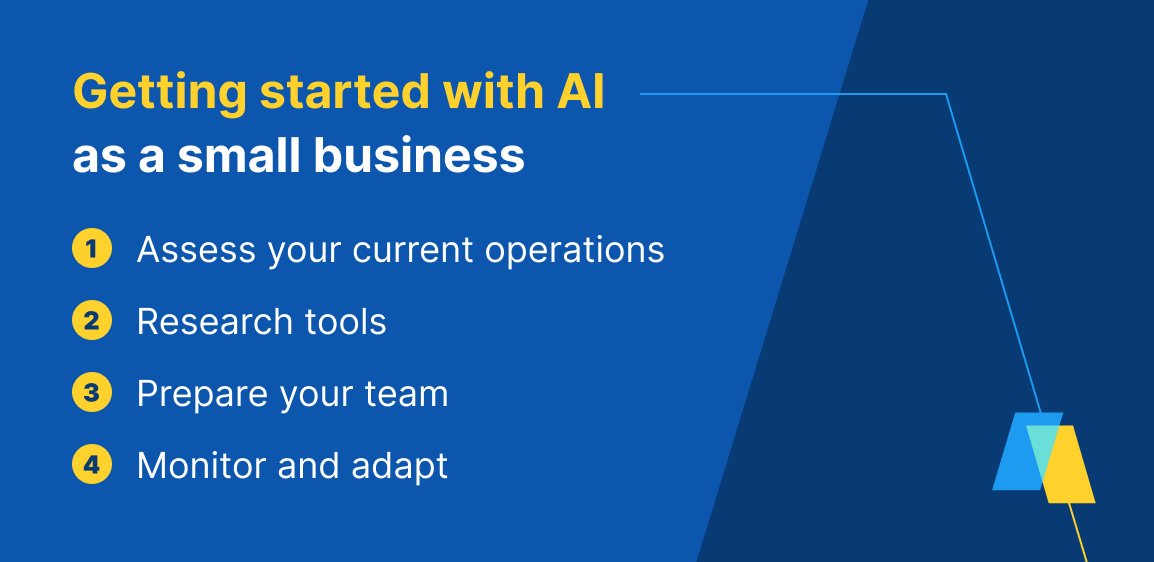The business landscape is ever-changing, with new developments occurring constantly, from regulatory updates to shifts in employee mindsets and the need for new skills to effectively compete in a digital world. Amid frequent changes, you may wonder what it takes for your small business to compete with bigger players in your market.
As artificial intelligence (AI) becomes more affordable and accessible to the average business, it presents opportunities to close the gap between small companies and larger firms. Use it to take on tasks that traditionally required more workers.
Among small and medium businesses, 75% are experimenting with AI, and among those using AI, 86% say they see improved profit margins from the technology. If you’ve been considering AI but have been reluctant to take the first step, now is your chance to explore the benefits and potential applications.

AI: The small business advantage
AI provides a competitive edge for small businesses, acting as everything from your personal assistant to a collaborative partner. By using this technology, you will experience many benefits, including:
- Enhanced decision-making: AI backs your decisions with concrete data. Use it to analyze internal data or information from a competitor to make changes from an informed perspective.
- Improved efficiency: Do more work in less time. Intelligent computer systems are especially useful for automating repetitive, simple tasks, from replying to emails to summarizing meeting notes.
- Brainstorming: In a small company, you may sometimes desire additional opinions or perspectives. Computer systems serve in that role, helping identify hidden risks or alternative strategies you haven’t considered.
- Cost savings: Every dollar counts toward your business success, so save on expenses by using AI to help you identify opportunities to retain money or reduce risks.
- Growth opportunities: Intelligent systems help you grow by reducing your workload without increasing your workforce. They also analyze customer behavior and other data to improve sales and revenue.
As a small business, you don’t have the time or money to invest in every tool, so how can you find the one that offers the most competitive advantages? Consider using TeamAI, a workspace built around the needs of businesses.
This platform offers access to all the major large language models (LLMs) in one place, such as those from Gemini and OpenAI. It uses a collaborative workspace where users share conversations and save documents across teams.
You also gain features like a Custom Prompt Library for storing your best prompts and Custom Agents that understand your business, processes, and goals. TeamAI is simple to set up and use, even for those with limited technical expertise.
AI use cases: Key areas for growth
You might fill multiple roles as a small business owner, from managing business financials to handling human resources. Other team members face similar situations, such as marketing team members who cover everything from social media to website content creation.
Artificial intelligence helps fill the gaps where you need additional expertise. Here are a few potential use cases for your business.

Customer service
Limited resources make it difficult to give customers the personalized and speedy service they want. With AI, you can provide customers with the 24/7 support they need.
One application might include using AI to create more personalized customer interactions. For example, transform a brusque email reply into a friendlier interaction that engages customers. You could also create unique responses to customer reviews.
Another application involves creating a custom chatbot trained on your documents. The chatbot will quickly respond to simple inquiries on your website to save you time. Within TeamAI, you can use the Custom Agents feature to create specialized assistants for many purposes, including website chatbots.
Marketing and content
Marketing on a limited budget brings challenges, but AI helps. Here are a few potential uses in marketing:
- Planning and outlining content like website product descriptions, blog posts, and newsletters
- Creating a social media content calendar or drafting posts for various platforms
- Developing a comprehensive marketing strategy
- Analyzing your customers and audience for more personalized campaigns
TeamAI enables you to accomplish all these functions and more. The solution includes a library of prebuilt prompts, including a folder for prompts specific to marketing. Build and save custom prompts tailored to your business.
The platform’s AI Data Hubs feature lets you store and chat with all your marketing resources, from branding guidelines to content templates. You can also use Automated Workflows to streamline repetitive tasks.
Data and decision-making
Data is a powerful resource, but it often becomes unwieldy, and you may lack the time to analyze it fully. As a small business, you have access to plenty of information. AI enables you to unlock its potential.
For example, you may collect customer data like purchase history and demographics. AI can help you analyze this information to find purchasing patterns and identify opportunities to appeal to new customers. Financial data, like revenue and expenses, inform better business decisions, especially when analyzed effectively using AI.
TeamAI includes various features that make it beneficial for data analysis and decision-making. The platform enables you to upload CSV files and generate analyses and reports in a snap.
It analyzes large amounts of text-based information, such as customer reviews and surveys. TeamAI’s Reasoning Model is beneficial for data analysis tasks involving qualitative or quantitative data.
Getting started with AI as a small business
As a small business, you’re likely more strategic and cautious in your AI adoption than larger companies. You may also need to focus on adopting solutions that are easy to use and bring immediate value to give you a return on your investment.
Here are a few steps to ease the process of getting started:
- Assess your current operations: Consider how you currently work and the areas where you would benefit most from an AI tool. You might begin by defining one to three use cases to address current challenges.
- Research tools: Once you’ve narrowed your focus, you can choose a suitable tool more effectively. Research tools to find one that will meet the use cases you have identified. Ideally, the solution should also offer the flexibility to continue to suit your needs as they change over time.
- Prepare your team: If you’ve never used AI in your business before, start with initial training on general topics, like building effective prompts, and more specific areas, like how to use the platform you’ve chosen.
- Monitor and adapt: Perfecting your strategy takes time. After you deploy a solution, add additional use cases or tweak existing ones. Openness to change means the difference between businesses that use AI and those that find competitive value in it.

Add AI to your workplace
If you’re considering adding AI to your small business, choose TeamAI. Start with a single-user workspace for $5 a month to try the platform’s exceptional features before you expand to your entire team.
All you need to do is create an account and choose your plan. Once you log in, explore all the incredible features, including multiple models, a Shared Prompt Library, AI Data Hubs, and Custom Agents.
